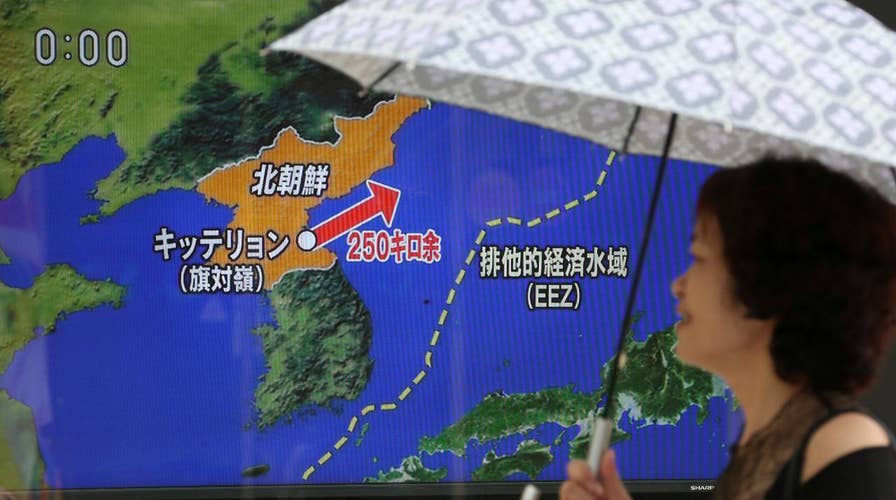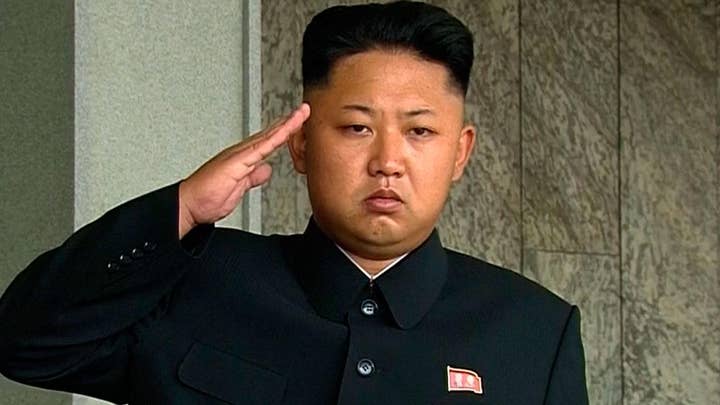South Korea's air force effectively fired back at North Korea's missile launch over Japan by conducting a live-fire drill involving powerful bombs, officials said early Tuesday.
Four F-15 fighters dropped eight MK-84 bombs that accurately hit targets at a military field near South Korea's eastern coast, Seoul's presidential spokesman Park Su-hyun said. Each bomb has an explosive yield of a ton, according to the country's air force.
Park also said South Korean national security director Chung Eui-yong called President Donald Trump's national security adviser H.R. McMaster to discuss the North's launch.
North Korea typically reacts with anger to U.S.-South Korean military drills, which are happening now, often testing weapons and threatening Seoul and Washington in its state-controlled media. But animosity is higher than usual following threats by Trump to unleash "fire and fury" on the North, and Pyongyang's stated plan to consider firing some of its missiles near Guam.
The Pentagon told reporters it was investigating the launch over Japan, adding: "North American Aerospace Defense Command (NORAD) determined the missile launch from North Korea did not pose a threat to North America." The U.S. Missile Defense Agency said the Japanese military did not attempt to intercept the missile.
Seoul's Joint Chiefs of Staff said the missile traveled around 1,677 miles and reached a maximum height of 341 miles as it flew over the northern Japanese island of Hokkaido. The launch appeared to be the first to cross over Japan since 2009.
The South Korean military said it was analyzing the launch with the United States and strengthened its monitoring and preparation in case of further actions from North Korea.
North Korea will no doubt be watching the world's reaction to see if it can use Tuesday's flight over Japan as a precedent for future launches. Japanese officials said there was no damage to ships or anything else reported. Japan's NHK TV said the missile separated into three parts. "We will do our utmost to protect people's lives," Prime Minister Shinzo Abe told reporters. "This reckless act of launching a missile that flies over our country is an unprecedented, serious and important threat."
Tuesday's launch came days after the North fired what was assessed as three short-range ballistic missiles into the sea and a month after its second flight test of an intercontinental ballistic missile, which analysts said could reach deep into the U.S. mainland when perfected.
South Korea's Foreign Ministry warned that the North would face a "strong response" from the U.S.-South Korean alliance if what it called nuclear and missile provocations continue. The ministry also urged Pyongyang to accept talks over its nuclear program and acknowledge that abandoning its nuclear ambitions is the only way to guarantee its security and economic development.

Earlier this month, when threatening to lob four Hwasong-12s, which are new intermediate-range missiles, into the waters near Guam, North Korea specifically said they would fly over Japanese territory. North Korea in June also angrily reacted to the launch of a Japanese satellite it said was aimed at spying on the North and said Tokyo was no longer entitled to fault Pyongyang "no matter what it launches or whether that crosses the sky above Japan."
Pyongyang regularly claims the U.S.-South Korean military exercises are an invasion rehearsal, although analysts say the North's anger is partly because the impoverished country must react with its own expensive drills and weapons tests. The allies say the war games are defensive and meant to counter North Korean aggression.
Fox News' Jennifer Griffin, Lucas Tomlinson and The Associated Press contributed to this report.










































